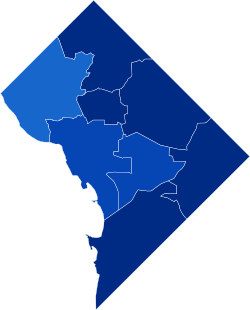| ||||||||||||||||||||||||||
| ||||||||||||||||||||||||||
Kerry 60–70% 70–80% 80–90% 90–100% | ||||||||||||||||||||||||||
| ||||||||||||||||||||||||||
| Elections in the District of Columbia |
|---|
 |
The 2004 United States presidential election in the District of Columbia took place on November 2, 2004, as part of the 2004 United States presidential election. Voters chose three representatives, or electors to the Electoral College, who voted for president and vice president. Prior to the election, Washington DC was considered to be a jurisdiction Kerry would win or safely blue.
Contents
As expected, the District of Columbia voted by an extremely large margin in favor of the Democratic candidate John F. Kerry. John F. Kerry won DC by a margin of victory of 79.84% over the incumbent George W. Bush, more than any state. At the time, this was also the largest Democratic margin of victory over a Republican candidate in the history of the district, but has since been surpassed by all presidential elections since. The greatest victory margin of these subsequent years was in 2016. Such victory margins may perhaps be attributed to the fact that D.C. only encompasses an urban core area (and those are generally very liberal in nature). A recent San Francisco study based on the 2004 presidential election exit polls, ranked Washington, D.C. as the 4th most liberal city in the country. [1] This information supports the fact that the District of Columbia has never voted for a Republican since the ratification of the 23rd Amendment.
As of 2024, this marks the last time that a Democratic presidential nominee would receive less than 90% of the vote in the District of Columbia.




